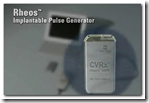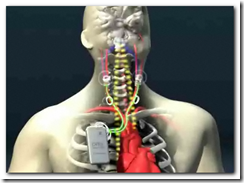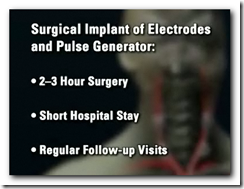The device is still under clinical trials at present and does require surgery that takes 2-3 hours. Perhaps soon we may have a choice on how to cover hypertension, device or drugs someday. There are around 300 patients participating at present.
Additional information on trials can be found at the links below. It works in conjunction with baroreceptors almost like a thermostat would and sends information to and from the brain. BD
So it's understandable that many cardiologists, in an effort to get to the root of the myriad health problems that stem from hypertension, have  focused on alleviating the condition with drugs. But patients whose extreme hypertension won’t respond to medication or changes in lifestyle may soon have a new option to lower their blood pressure: surgery.
focused on alleviating the condition with drugs. But patients whose extreme hypertension won’t respond to medication or changes in lifestyle may soon have a new option to lower their blood pressure: surgery.
On Sept. 19, 2008, Pareso had one of the devices implanted by CUMC neurosurgeon E. Sander Connolly, also the study's principal surgical investigator. Dr. Connolly said Pareso was an ideal candidate since his hypertension was particularly stubborn and his symptoms were not alleviated by medication.
Baroreceptors work like a thermostat that automatically turns on the air conditioning when the air temperature becomes too hot. By activating the baroreceptors and sending signals to the brain, the Rheos System causes the brain to perceive a rise in blood pressure. The brain then acts to reduce blood pressure by sending signals to the blood vessels, heart and kidneys, the major organ systems involved in the control of blood pressure.
Two weeks later Pareso came in for his check-up, and doctors recorded lower readings. The sutures in his neck here barely visible and Pareso said he was feeling fine: "My hope is to eventually get off the meds and get my energy back. After taking Catapres everyday, I would start dozing off. I'm not sleepy now."
The FDA-approved device used in this study is the Rheos System made by CVRx, a private, Minneapolis-based company that develops proprietary active implantable technology for the treatment of hypertension. Other centers participating in the trial include Washington University, Boston University Medical Center, University of Rochester and Hackensack University Medical Center.
For more information about the study, or to participate, please visit: http://www.bloodpressuretrial.com/index.html or call 1(888) 8BP-RISK.
http://www.cumc.columbia.edu/news/press_releases/Shimbo_RHEOS_Trial.html
Hat Tip: Medgadget





0 comments :
Post a Comment